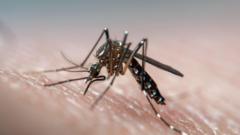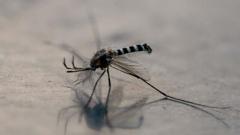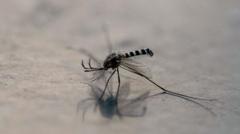A team from the University of California has successfully genetically altered male Aedes aegypti mosquitoes to become deaf, preventing them from mating and ultimately decreasing the population of these disease-spreading insects.
Innovative Strategy to Control Dengue: Genetically Deafen Mosquitoes

Innovative Strategy to Control Dengue: Genetically Deafen Mosquitoes
Researchers introduce a novel genetic approach to hinder mosquito mating, potentially reducing the spread of diseases like dengue and Zika.
In a groundbreaking study, scientists have developed an unconventional method to combat mosquito-borne illnesses such as dengue, yellow fever, and Zika by genetically modifying male mosquitoes to lose their hearing, inhibiting their ability to mate. These insects rely heavily on sound to locate potential mates, and by making the male mosquitoes deaf, researchers aim to reduce breeding success and lower disease transmission rates.
The research, spearheaded by the University of California, Irvine, focused on the Aedes aegypti species, which is responsible for infecting approximately 400 million people yearly. By altering a key genetic pathway connected to auditory perception, the scientists observed that the altered males failed to successfully detect female wingbeats, which serve as vital mating calls during flight. The engineered males were tested in cages alongside females but showed no interest, with no mating activity occurring even over extended periods.
The study highlighted the critical role of the trpVa protein, essential for sound detection, which was successfully knocked out in the modified male mosquitoes. In stark contrast, their wild-type counterparts exhibited high mating activity, showcasing the complete efficacy of the genetic modifications employed. The findings have been published in the journal PNAS, revealing that the acoustic cues emitted by females went unnoticed by the deafened males.
Dr. Joerg Albert from the University of Oldenburg, a specialist in mosquito mating behavior, praised the research, emphasizing the significant implications of the findings. He noted that this genetic approach not only validates the role of sound in mosquito reproduction but also suggests potential pathways to prevent their population growth. However, he cautioned that further investigation is necessary to assess the ecological impacts.
While alternative methods, such as releasing sterile males to diminish local mosquito populations, are under consideration, it is crucial to balance disease control strategies with the ecological contributions mosquitoes provide. These insects play vital roles in ecosystems, serving as food sources for various species and contributing to pollination. As researchers continue to explore different approaches like genetic manipulation, understanding these dynamics will be essential for sustainable solutions.









